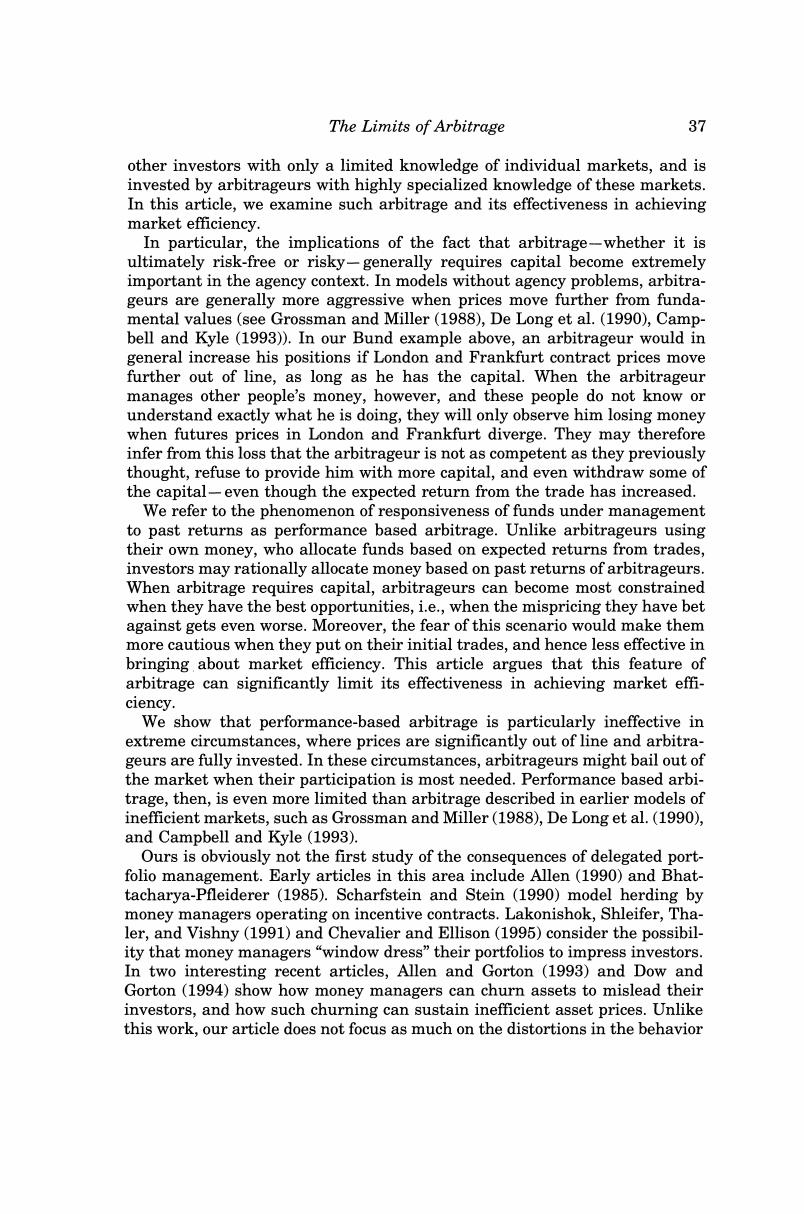正在加载图片...

The Limits of Arbitrage 37 other investors with only a limited knowledge of individual markets,and is invested by arbitrageurs with highly specialized knowledge of these markets. In this article,we examine such arbitrage and its effectiveness in achieving market efficiency. In particular,the implications of the fact that arbitrage-whether it is ultimately risk-free or risky-generally requires capital become extremely important in the agency context.In models without agency problems,arbitra- geurs are generally more aggressive when prices move further from funda- mental values (see Grossman and Miller(1988),De Long et al.(1990),Camp- bell and Kyle(1993)).In our Bund example above,an arbitrageur would in general increase his positions if London and Frankfurt contract prices move further out of line,as long as he has the capital.When the arbitrageur manages other people's money,however,and these people do not know or understand exactly what he is doing,they will only observe him losing money when futures prices in London and Frankfurt diverge.They may therefore infer from this loss that the arbitrageur is not as competent as they previously thought,refuse to provide him with more capital,and even withdraw some of the capital-even though the expected return from the trade has increased. We refer to the phenomenon of responsiveness of funds under management to past returns as performance based arbitrage.Unlike arbitrageurs using their own money,who allocate funds based on expected returns from trades, investors may rationally allocate money based on past returns of arbitrageurs. When arbitrage requires capital,arbitrageurs can become most constrained when they have the best opportunities,i.e.,when the mispricing they have bet against gets even worse.Moreover,the fear of this scenario would make them more cautious when they put on their initial trades,and hence less effective in bringing about market efficiency.This article argues that this feature of arbitrage can significantly limit its effectiveness in achieving market effi- ciency. We show that performance-based arbitrage is particularly ineffective in extreme circumstances,where prices are significantly out of line and arbitra- geurs are fully invested.In these circumstances,arbitrageurs might bail out of the market when their participation is most needed.Performance based arbi- trage,then,is even more limited than arbitrage described in earlier models of inefficient markets,such as Grossman and Miller(1988),De Long et al.(1990), and Campbell and Kyle (1993). Ours is obviously not the first study of the consequences of delegated port- folio management.Early articles in this area include Allen(1990)and Bhat- tacharya-Pfleiderer (1985).Scharfstein and Stein (1990)model herding by money managers operating on incentive contracts.Lakonishok,Shleifer,Tha- ler,and Vishny(1991)and Chevalier and Ellison(1995)consider the possibil- ity that money managers "window dress"their portfolios to impress investors. In two interesting recent articles,Allen and Gorton (1993)and Dow and Gorton(1994)show how money managers can churn assets to mislead their investors,and how such churning can sustain inefficient asset prices.Unlike this work,our article does not focus as much on the distortions in the behavior